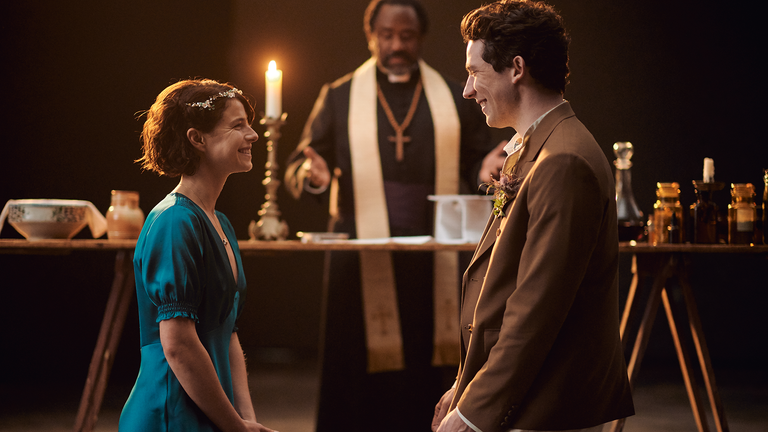One of Shakespeare’s most famous plays has been reimagined after a planned run at the National Theatre couldn’t go ahead because of the pandemic.
Instead Romeo & Juliet has become the first original production for TV, filmed at the iconic venue.
The Crown star Josh O’Connor, who recently won a Golden Globe for his work on the royal drama series, plays Romeo.
He told Sky News that the mix of theatre and TV was a special experience.
“It was incredible… it was my dream to work at the National Theatre… but it wasn’t quite how I imagined it in my dreams, it was something unique,” he said.
“You know, hopefully it will never happen again insofar as the pandemic, but it felt like we were discovering every day – like finding a new way of working.
“It’s very rare for that to happen, so I had the time of my life.”
Like all productions done in the last year, the shoot had to adhere to strict COVID-safe protocols.
“We were more or less a bubble – lots of the cast lived in a housing situation together,” explained Jessie Buckley who plays Juliet.
“They were really vigilant with it, you know, we all wore masks, we washed our hands when we came in, we were being tested twice a week.
“So it was taken very seriously, but also it was taken seriously so we could work.”
Buckley says the regulations also put a time pressure on scenes that may otherwise be taken more slowly.
“On days where we had quite intimate scenes that we’d be rehearsing, there was like a three-hour window on the back of being tested where we would be given the thumbs up that we were negative and we could kind of tear into each other.”
O’Connor says he appreciates that as cast members they were able to fulfil a need that many couldn’t.
“We were so lucky, like I just remember every day being like, you know, we were hungry for something like social contact, as everyone else is in the country.”
It’s certainly not the first time that the arts have been forced to adapt due to world events.
But the National Theatre’s director and joint chief executive, Rufus Norris, says it’s not yet clear is if this hybrid model might be here to stay.
“I think if you look through history, these periods of challenge often lead to revolution or evolution,” he told Sky News.
“There’s a plague in the late 16th century that meant that the players had to leave London and tour round, they went to a place called Stratford, a young man went to see a play there and that’s how Shakespeare met theatre.”
“Another plague later on meant that Shakespeare had to sit inside and write sonnets and King Lear; when the Puritans lost their control over entertainment, there was a 30-year period where there were no plays and at the end of that women went on stage for the first time; and the Arts Council was formed out of the Second World War.
“So in each period like this where we’re going through tremendous difficulty, aspects emerge… I don’t know whether this is the beginning of a new form – we’ll find out.”
With theatre having long-faced criticism for failing to reach a broader audience, with many simply unable to afford tickets, the coronavirus-forced closures may have fast-tracked a new way of bringing plays to people.
And if the pandemic has made “all the world a stage” – perhaps Shakespeare would approve.
Romeo & Juliet will premiere on Sky Arts on Easter Sunday 4th April


